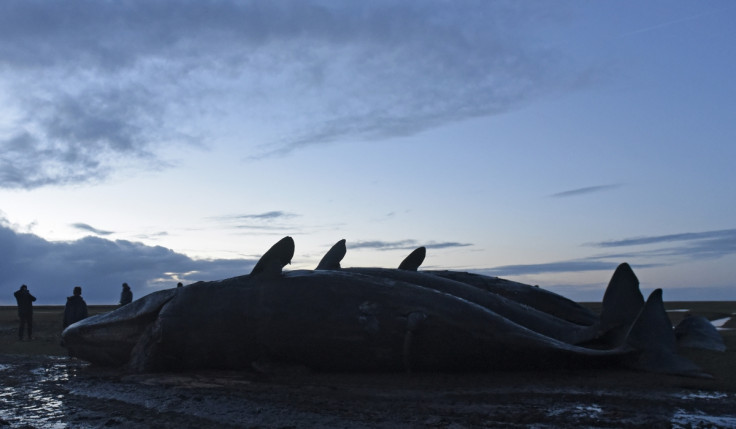Sperm Whale washed up on Hunstanton Beach dies

A 30-tonne sperm whale which was spotted in a state of difficulty off the Norfolk Coast at Hunstanton Beach has died. The whale had been in trouble for some time and experts say it would not have survived even if it had managed to find its way into deep water, as its organs would have been under its colossal weight.
The 46-foot (14-metre) whale was first spotted thrashing around at 7.30am GMT on 4 February and the beach was closed to the public. Wildlife experts poured buckets of water on the creature in a bid to reduce its discomfort. At around 2.50pm GMT the tide came in and partly submerged the whale, but it did not move. It was declared dead a few hours later at 8.00pm. Operations manager at British Divers Marine Life Rescue (BDMLR), Stephen Marsh said: "We're very sad to confirm that the whale has died but it is a bit of a relief because it had been in quite a lot of suffering."
Great whales rarely survive being beached because of their size. At sea they are supported by the water but when stranded on dry land they become crushed under their own weight. In total, 29 whales have died in strandings across Europe in the last fortnight, six of them on the UK's east coast.
Another sperm whale is stranded on the Norfolk cost. A brief history of beached whales: https://t.co/EnfwgEaGmx pic.twitter.com/P54nN2nOl4
— Wired UK (@WiredUK) February 4, 2016
Rob Deaville, project manager at the Cetacean Strandings Investigation Programme he had not encountered anything of the sort over two decades. "We know why the whales have died because they die through the process of live stranding. Obviously what has brought them into the North Sea in the first place is a question everyone wants to answer but that will take many weeks to months to try to address."
Marine experts are unsure why strandings take place, with theories including sonar from boats destroying the animal's navigational senses. However, whale stranding experts point to similar strandings as far back as the 16th century when the whale population was much higher. Whales were hunted almost to extinction in the 19th century but their numbers are gradually rising again, leading to greater competition for food.
© Copyright IBTimes 2025. All rights reserved.






















